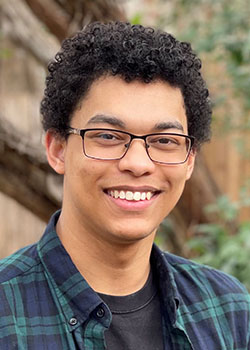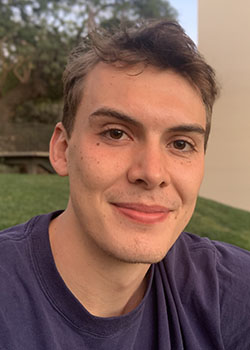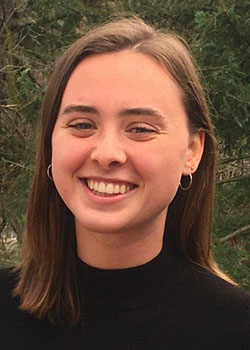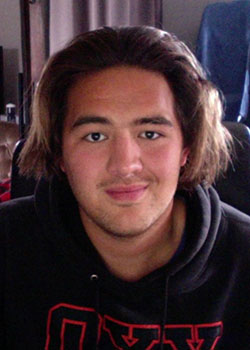Meet some of our physics majors.

Kyle Eric Smith
Hometown: Los Angeles, CA
Majors: physics, math
What was your motivation to major in physics?
I was originally sucked into the world of physics through an astronomy book I read when I was extremely young. I didn’t understand any of the words, but the pictures were so beautiful that I was hooked instantly. Later down the line, I started enjoying the problem-solving aspects of math, and I realized that astrophysics was the intersection of those two subjects that I enjoyed.
Can you describe your working relationships with physics professors? Are there any standout classes you’ve taken?
I love all of the physics professors. They are all extremely knowledgeable, and I have had conversations with most of them. One of my favorite classes at Occidental was actually Introductory Mechanics with Prof. Schramm. He is one of those professors that can explain complicated and/or boring physics concepts in a fun and applicable way. A slight warning, his class is hard and his tests are even harder, but it’s definitely worth taking as I learned a lot from it partly because it was challenging.
Occidental has influenced me to pursue [grad school] by allowing me such easy access to research while also showing me how physics can be a collaborative subject.
What do you find most compelling about studying physics?
What I find most compelling about studying physics is just seeing how involved math is in our everyday life. The fact that some of the weirdest and most convoluted physics phenomena can be explained by simple math is mind-blowing. This drive to learn more about our working universe is what pushes me to continue pursuing physics.
What are your ambitions post-Oxy and how has the liberal arts approach helped to shape these ambitions?
My ambition post-Oxy is to enter an astrophysics program at a graduate school while still participating in astronomy/physics research. Occidental has influenced me to pursue this goal by allowing me such easy access to research while also showing me how physics can be a collaborative subject.
Whether it’s...struggling through practice tests together, getting help understanding a hard physics problem, or even just having a laser tag battle between students and professors, I’ve felt welcomed and supported every second I’ve been in this department.
Do you have any advice for a student considering a major in physics?
My advice for prospective physics majors is definitely to take advantage of the many opportunities that Occidental provides. The Academic Mastery Program (AMP) is basically free tutoring, allowing you to go more in-depth with the subjects taught in class, helping you understand the concepts more deeply. The Research Early Access Program (REAP) and Summer Research Program (SRP) are extremely accessible, especially for first-year students, allowing you to get research opportunities very early on in your college career. Being open to talking to other physics majors and professors is also extremely beneficial, as the physics department is very collaborative. Last but not least, enjoy the subject! There will be hard topics, and you will struggle a little bit, but that’s just part of the fun!
What is the “vibe” of the physics department?
The vibe of the physics department is definitely friendly and uplifting. Whether it’s going to AMP and struggling through practice tests together, getting help understanding a hard physics problem, or even just having a laser tag battle between students and professors, I’ve felt welcomed and supported every second I’ve been in this department. Everyone in it is extremely knowledgeable and wants to see everyone succeed at physics, even you.
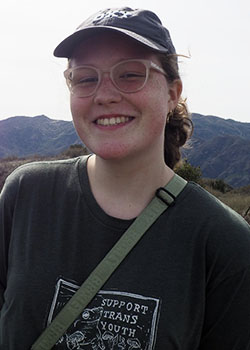
Skylar Garnett
Hometown: Beverly Hills, CA
Majors: physics and mathematics; minors: Comparative Studies in Literature & Culture
What was your motivation to major in physics?
When I was a kid, I would sit in front of the television watching Neil deGrasse Tyson’s Cosmos. I remember being in awe at humanity’s ability to not only witness these celestial phenomena, but also document and understand them. Ever since then, I have always been interested in figuring out more about the universe through the languages of mathematics and physics.
Can you describe your working relationships with physics professors?
I am lucky enough to have Prof. Sabrina Stierwalt, an astrophysicist, as an academic advisor. She is also offering a summer research program that I am highly interested in. I worked extensively with her to refine my application to the program, and while working with her, her enthusiasm about astrophysics was infectious and made me even more excited to learn. I have found that the majority of professors in the physics program are the same: excited to share their knowledge with people willing to listen.
What do you find most compelling about studying physics?
No matter where you go, you experience physics every day. The ability to understand the world around you allows you to appreciate it even more, and this is why I enjoy studying physics. In high-level mathematics, most of the concepts you learn are very theoretical, but in physics, even the most advanced and nuanced concepts still have connections back to the real world. After each of my physics classes, I come out with a greater understanding and appreciation for my reality, and I am always left hungry for more.
While working with [advisor Prof. Sabrina Stierwalt], her enthusiasm about astrophysics was infectious and made me even more excited to learn.
Do you have any advice for a student considering a major in physics?
Even if you aren’t sure if you would like to major in physics, taking a few classes is still very beneficial for many different fields. The critical thinking skills gained from my physics laboratory and classes allow me to tackle problems I may not know how to solve, and still be able to work towards a solution. A surprising amount of physics is being creative; whether it’s using equations you’ve already found to calculate an unknown, or planning an experiment to determine the relationship between two variables, creativity is fundamental to physics.
What is the “vibe” of the physics department?
The physics department is, in the best way, full of nerdy people. Though this may initially seem to be an insult, I mean it in a very endearing way. People in the physics department are always excited to learn new things and share their discoveries with their peers. You will never feel as though you can’t ask questions if you are confused. Physics can be a confusing topic, but everyone I know in the physics department is more than happy to help.
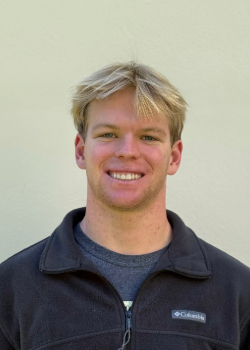
Jack Davis
Hometown: Livermore, CA
Major: physics; minor: mathematics
What was your motivation to major in physics?
There was no specific moment that motivated me to major in physics, but I knew I was good at math and enjoyed the satisfaction of solving problems with real-life applications, which naturally led me to physics.
Can you describe your working relationships with physics professors? Are there any standout classes you’ve taken?
One standout class for me was Introductory Electricity and Magnetism with Professor Stierwalt. At the time, this was the most challenging physics class I had taken, but it taught me the importance of seeking help from the professor when I was having trouble with a concept.
I highly recommend taking advantage of resources such as faculty office hours and peer tutoring, which helped me significantly.
Do you have any advice for a student considering a major in physics?
It can be difficult and there will be many moments when you will feel lost or confused. I highly recommend taking advantage of resources such as faculty office hours and peer tutoring, which helped me significantly.
David Simpson-Heil
Hometown: Corte Madera, CA
Major: physics; minor: mathematics
What was your motivation to major in physics?
During my first year in high school, my chemistry teacher explained the process of a star’s death in a massive supernova explosion. The explanation blew my mind, so I started diving down rabbit holes about physics for the rest of high school. Later, while learning calculus, I started seeing the mathematical foundation of physics, and learning about how math and physics conceptually merge solidified my interest in studying the subject.
Can you describe working relationships with physics professors? Are there any standout classes you've taken?
I’ve found that the professors in the physics department are very accessible and happy to help students grasp concepts both in and out of class. I’ve had a great time with pretty much all of my courses in the department, but one that really stands out for me was “Astrophysics” with Professor Sabrina Stierwalt. Astrophysics was the first subfield in physics that really grabbed my attention so I was already excited. Professor Stierwalt turned out to be super down to earth (haha), and she clearly cares about making sure that her students truly understand the topics she’s teaching.
We studied Hubble Space Telescope images to better understand the influence galaxy interaction had on star formation. It was great to learn research techniques and be involved in a developing area of astrophysics research.
Have you taken part in any research opportunities?
I participated in Oxy’s Summer Research Program, working with Professor Stierwalt and the Oxy Galaxy Group to study dwarf galaxy mergers. We studied Hubble Space Telescope images to better understand the influence galaxy interaction had on star formation. It was great to learn research techniques and be involved with a developing area of astrophysics research.
What's most compelling about physics?
Trying to figure out how and why things happen the way they do is a wonderful challenge. There’s a lot going on in the universe, and physics is all about trying to make sense of it. I love the moments when a concept or problem suddenly clicks, and I’m able to finally wrap my head around it.
Do you have advice for a student considering a major in physics?
Take advantage of the resources at your disposal. The professors are super helpful in their office hours, there are peer learning opportunities for the introductory courses and you can work with your classmates to wrap your head around the topics you find more difficult. These resources not only help you perform better academically, they also allow you to form stronger relationships with your peers and professors that can open up more opportunities for you in the future.
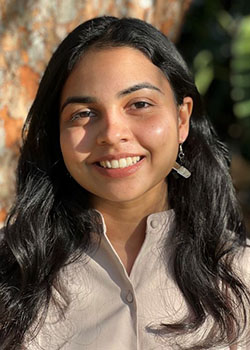
Tehreem Hai
Hometown: Karachi, Pakistan
Major: physics; minor: mathematics
What was your motivation to major in physics?
Like a lot of physics majors, I lucked out in getting a great high school physics teacher who encouraged me and explained concepts in a really interesting way. I eventually realized that physics was the only class that I looked forward to, asked questions in and put a lot of effort into.
Have you taken part in any student research opportunities at Oxy or elsewhere?
I worked with Professor Sabrina Stierwalt last summer at the URC’s Summer Research Program, where we researched the effects of mergers between dwarf galaxies on star formation in those galaxies with some really cool Hubble data. I plan on working with her in this summer’s program as well. [Editor’s note: Tehreem virtually attended the 2021 American Astronomical Society Conference, where she presented her research on merging galaxies and super star clusters to other scientists.]
What do you find most compelling about studying physics?
I love the sheer range of it; you can zoom in on the tiniest particle and see how it moves and then you can zoom out to study galaxy clusters and the beginning of the universe, sometimes in the same field of research.
An important part of being a scientist (and a science communicator) is being able to accurately convey your work and science to the public ... at Oxy I have been able to take coursework to prepare myself for that.
What are your ambitions post-Oxy and how has the liberal arts approach helped to shape these ambitions?
I want to go to graduate school after Oxy and pursue a career in academia, and I am also interested in science communication. Unlike the expectations associated with the popular image of the isolated, reclusive scientist, an important part of being a scientist (and a science communicator) is being able to accurately convey your work and science to the public. This is not always fully explored at more STEM-focused schools, but at Oxy I have been able to take coursework to prepare myself for that. One of my CSPs, taught by Professor Natalie Muren from the chemistry department, focused on science communication and convinced me to pursue it while teaching me the critical thinking and communication skills I would need for it. The core classes I have taken, including those from the Comparative Studies in Literature & Culture and education departments, have let me make interdisciplinary links and stay aware of the world, which informs and is informed by physics.
Do you have any advice for a student considering a major in physics?
This is something I realized fairly late: there is no such thing as being ‘smart enough’ to pursue physics. If you think you like it enough to get yourself through the difficult/boring parts, you already belong. Hold on to that fact if imposter syndrome strikes.
Back to top
To see more Meet Our Majors profiles, visit the main page.

